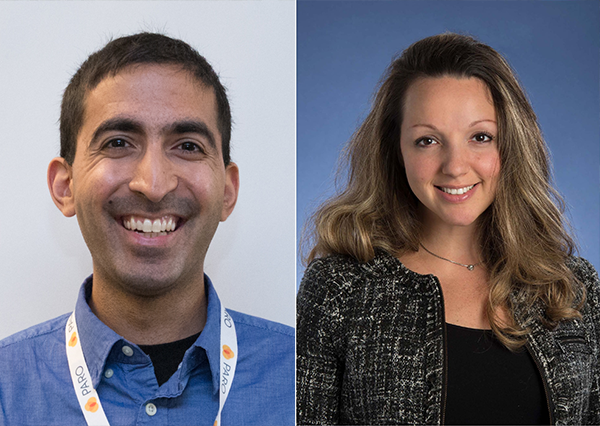Main Second Level Navigation
- Welcome
- Why Toronto?
- History of the Department
- Vision & Strategic Priorities
- Our Leadership
- Our Support Staff
- Location & Contact
- Departmental Committees
- Department of Medicine Prizes & Awards
- Department of Medicine Resident Awards
- Department of Medicine: Self-Study Report (2013 - 2018)
- Department of Medicine: Self-Study Report (2018 - 2023)
- Communication Resources
- News
- Events
Meet the Department of Medicine’s Millennial Representatives, the newest members of the DoM Executive Committee

Brianne Tulk
In 2015 the Department of Medicine appointed its first two Millennial Representatives to the DoM Executive Committee – Drs. Sam Sabbah and Savannah Cardew. They were added to the DoM executive committee to help ensure that the perspectives, interests and needs of younger faculty members are considered in the department’s activities. The department is very grateful to Sam and Savannah for their contributions.

Dr. Pardhan is a Lecturer and Clinician Teacher in the Division of Emergency Medicine and a staff physician at Sunnybrook Health Sciences Centre. Dr. Pardhan's scholarly focus is on medical education and education policy, with current projects examining supervision and assessment in the transition to practice, tools to increase the number of evaluations received by clinical faculty members from trainees, and how stringent versus lenient feedback impacts learning.
Dr. Steiman is an Assistant Professor and Clinician in Quality and Innovation in the Division of Rheumatology and a staff physician at Mount Sinai Hospital/University Health Network. Her scholarly focus is on quality improvement initiatives to improve the delivery of care to patients with complex, often multi-systemic, rheumatologic diseases, such as lupus.
The new Millennial Representatives were asked to share with you why they are excited to take on this important role.
Why do you feel it’s important to have millennial representation on the DoM Executive Committee?
Dr. Pardhan: A millennial representative on the DoM Executive is well-positioned to share the experiences of new and future members and help to shape policy going forward. Specifically, I plan to suggest several potential opportunities that the DoM Executive might explore to help new and future faculty to deal with challenges they face and support them in their endeavours. This includes identifying additional faculty tracks to match the variability of new faculty members’ expertise, working with divisions to facilitate transition-to-practice after residency, enhancing diversity in committee membership and leadership, and engaging in early succession planning with a clear mandate to engage new in practice physicians.
Dr. Steiman: We are all stakeholders in the Department and its future, and are wholeheartedly invested in its success. I think it is important to have "millennial" representation in order for us to be aware of the Department's current status and future direction, and for the younger faculty's thoughts and ideas to be shared and considered as the Department evolves.
What are some of the biggest issues facing young physicians and faculty today?
Dr. Pardhan: Millennial physicians are a highly diverse group of physicians, hailing from a variety of geographic, ethnic and socioeconomic backgrounds. Through this diversity, there are core issues this group faces. The deregulation of medical school tuition, combined with the high cost of living in the areas where we train, the high cost of electives and the high cost of certification have led to this group, as a whole, experiencing extremely high debt loads at the completion of their training. In lock step with this trend has been the increasing expectation from hospitals and universities that additional credentials, beyond specialist certification, be obtained prior to being hired, increasing the financial burden on younger physicians. This credential creep also leads to employment uncertainty and may lead to delays in achieving life milestones. This is further compounded by un- and underemployment among specialists that has led to a culture where new in practice specialists are brought on to cover the clinical load with no commitment to long-term job security.
Dr. Steiman: I think we are faced with many of the classic issues that faculty have faced for eons (well, maybe decades): establishing one's academic focus, navigating funding to do so in a milieu of tight purse strings, establishing a clinical niche and building a practice, and achieving this while in pursuit of the elusive ideal "work-life" balance. I think what is unique about these challenges contemporarily is that they are played out on a stage where supply and demand are dramatically out of sync: grant funding pools are drying, patient complexity and wait lists are high and long, and technology has encroached such that there is ever increasing demand to respond to emails faster, chart and document more. In short, it's a busy, demanding and competitive life.
What advice do you have for other young faculty, or to young physicians aspiring to becoming faculty?
Dr. Pardhan: I believe that new faculty members should take new opportunities that are presented to them that align with their career goals or that will be a stepping stone to reach those goals. We are the future of the profession and should strive to take on positions that allow us to effect true, positive change for ourselves and our colleagues. New faculty should also identify what their personal and professional priorities are and work to ensure work life balance. With increasing data being presented regarding increasing levels of burnout across the profession and the potential negative implications on patient care, it is essential for us to lead by example for both our colleagues and trainees.
Dr. Steiman: I'm not sure I'm qualified to give advice! But if I must, I'll quote Polonius from Hamlet: "This above all: to thine own self be true:" Do what you love and love what you do - my trajectory to becoming faculty was not linear, and my focus evolved. I'm glad that I have been able to find a position that I find so challenging and fulfilling.

